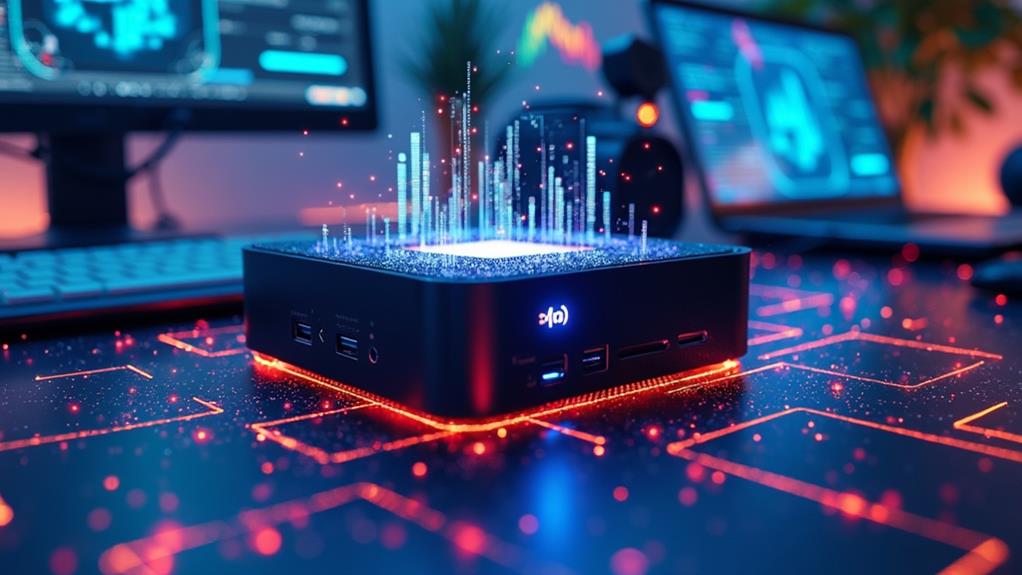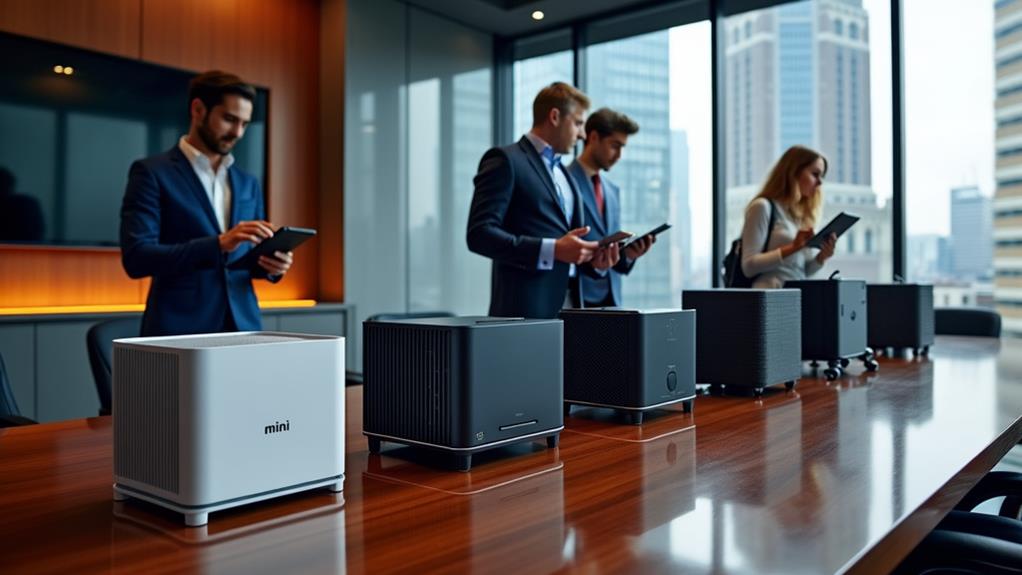



When you're setting up a reliable home cloud storage system, key features to prioritize include efficient processors like Intel Core i5 or AMD Ryzen 5, generous RAM (16GB or more), and high-speed storage with M.2 NVMe SSDs. Connectivity options such as Gigabit Ethernet, Wi-Fi 6, and multiple USB 3.2 Gen 2 or Thunderbolt ports are essential for fast data transfers and remote access. But which mini PCs effectively combine these features to meet your cloud storage needs?
Key Takeaways
- Efficient Processors: Prioritize mini PCs with Intel Core i5 or AMD Ryzen 5 processors for efficient file shredding, transcoding, and concurrent connections.
- Memory and Storage: Ensure a minimum 8GB RAM and high-speed M.2 NVMe SSD storage for seamless multitasking and minimal latency.
- Reliable Connectivity: Opt for mini PCs with Gigabit Ethernet, Wi-Fi 6, and multiple USB 3.2 Gen 2 or Thunderbolt ports for fast data transfers and remote access.
- Power Efficiency: Consider ARM-based, Intel Celeron, or AMD Ryzen-based mini PCs for low-power consumption (10-40W) and integrated graphics handling storage workloads efficiently.
- Expansion and Compatibility: Look for mini PCs with expansion options like PCIE cards, multiple SATA connections, and compatibility with external storage solutions like NAS and DAS enclosures.
Key Features for Home Cloud Mini PCs
When building a home cloud server, you should prioritize key features in your mini PC that guarantee efficient file sharing, streaming, and multitasking capabilities.
For optimal performance, the processor is important. An Intel Core i5 or AMD Ryzen 5 CPU or higher ensures that your home server can handle file shredding, transcoding, and numerous concurrent connections. Additionally, sufficient RAM is necessary; a minimum of 8GB, preferably 16GB or more, ensures seamless multitasking and quick response times.
High-speed storage is essential for fast file access. Opt for mini PCs with M.2 NVMe SSDs, which minimize latency and enhance overall performance. Reliable connectivity options are also crucial. Look for mini PCs with Gigabit Ethernet ports, Wi-Fi 6, and multiple USB 3.2 Gen 2 or Thunderbolt ports for fast data transfers and remote access.
Handpicked Models for Cloud Storage
Some great options for cloud storage are available in the form of mini PCs. These compact devices offer robust performance, making them perfect for home cloud storage solutions. For instance, the NEOSMAY MINI PC is equipped with a 12th Gen Intel Core i5-1240P CPU, 16GB RAM, and a 512GB NVME SSD. This setup guarantees smooth operation and rapid file access. Add to that WiFi 6, Dual 2.5Gbe LAN, and Thunderbolt 4 ports, which provide seamless connectivity options.
Another notable choice is the Mac Mini combined with an OWC Mercury Elite Pro Quad Thunderbolt 3/4 enclosure. This configuration supports macOS RAID1/10 and Time Machine, confirming robust data management. Integration with a Synology NAS provides additional backup capabilities, giving you peace of mind.
In addition to these desktop solutions, USB storage options are available. The Amazon DAS enclosure with 5 x 4TB HGST drives offers a Direct Attach Storage option, albeit with considerations for parallel disk access and reliability. Overall, these mini PCs and storage configurations provide a range of options for setting up a reliable home cloud storage system.
Best Home Cloud Mini PC Alternatives
You can explore several mini PC alternatives for setting up your home cloud storage system, each offering unique performance and connectivity features. One excellent option is the NEOSMAY MINI PC, which boasts a powerful 12th Gen Intel Core i5-1240P CPU, 16GB RAM, and a fast 512GB NVME SSD. This mini PC also includes WiFi 6, Dual 2.5Gbe LAN, Thunderbolt 4, and multiple display ports.
For additional storage, consider direct attach storage (DAS) enclosures like the Amazon DAS with 5 x 4TB HGST drives. However, it is crucial to recognize that USB storage can be unreliable, leading to performance issues when used with ZFS. To mitigate this, look into alternatives like eSATA or newer USB versions for more reliable connectivity.
Moreover, you can enhance storage capabilities internally by using PCIE cards for multiple SATA connections. Additionally, 3D printed enclosures or ASUS NVME storage solutions offer flexible storage options. For a different approach, pair a Mac Mini with an OWC Mercury Elite Pro Quad Thunderbolt 3/4 enclosure to utilize macOS RAID1/10 and Time Machine features. You might also consider a Synology 1019+ for backup and cloud backup solutions. This variety of mini PC alternatives offers you flexibility and performance when building your home cloud storage system.
Upgrading and Expanding Storage Options
The 'Howdy Photography' thread on Reddit generalized a discussion about upgrading and expanding storage options for mini PCs running home cloud storage solutions. The strategies covered include:
- Using internal SATA or NVME storage to maximize local storage capacity.
- Adding multiple SATA connections with PCIE expansion cards for direct attached storage (DAS) enclosures.
- Exploring 3D printed enclosures to house additional storage drives connected via eSATA or USB 3.1 for improved performance.
- Utilizing compact, high-speed storage devices like the ASUS NVME for enhanced storage.
- Considering rackmount server hardware for substantially more storage capacity.
For the full details of how to make a mini PC into a cloud.photo storage server, please refer to the complete thread on Reddit.
Power Efficiency in Home Cloud Mini PCs
When setting up a home cloud storage mini PC, selecting devices that strike a balance between performance and power consumption is crucial to minimize energy expenditures and reduce environmental impact efficiently. This balance is key, as high-performance mini PCs can quickly rack up your electricity bill. Essential options that fit your needs.
For low-power, always-on solutions, power-efficient ARM-based mini PCs consume less than 10W of power, ideal for small storage needs. If you need more power, Intel Celeron and Pentium-based mini PCs like the Beelink Mini PC offer a balance of performance and power efficiency, drawing around 15-25W. AMD Ryzen-based mini PCs deliver more processing power while maintaining relatively low power consumption of 30-40W, making them suitable for more demanding cloud tasks. Additionally, mini PCs with integrated Intel UHD Graphics can handle storage workloads efficiently, consuming 20-30W without a dedicated graphics card. Finally, fanless mini PCs like the Zotac ZBOX CI327 Nano use passive cooling and low-power CPUs to achieve power efficiencies of 10-15W, making them energy-efficient choices.
Top Performance for Cloud Storage Mini PCs
To achieve the highest performance for your home cloud storage, consider leveraging the advanced features and specifications of powerful mini PCs like the NEOSMAY MINI PC with its 12th Gen Intel Core i5-1240P processor, 16GB of RAM, and 512GB NVME SSD, which provide extensive storage capabilities.
These advanced features offer numerous benefits for your home cloud storage:
- Enhanced Data Access: Enjoy fast and reliable data access with multiple display port options, WiFi 6, and dual 2.5Gbe LAN connectivity.
- Compact PC with High Storage Capacity: Store more data in a compact form factor with the capacity for multiple SSD/NVME drives and opportunities to expand with external storage solutions.
- Thunderbolt 4 and NVME SSD: Utilize the lightning-fast performance of Thunderbolt 4 and NVME SSD to maintain the highest levels of data transfer and storage reliability.
- Future-Proof Technology: Stay ahead with the latest technology, including 12th Gen Intel processors and USB 3.1 (10Gbps) connectivity for effective multi-drive setups.
- Robust Backup Solutions: Couple your mini PC with additional backup solutions like Synology NAS and macOS RAID1/10 for inclusive data security.
Frequently Asked Questions
Can You Use a Mini PC as a Home Server?
You can definitely use a mini PC as a home server, leveraging its small size, energy-efficiency, and great performance for storing and managing files with expandable storage options and secure backup capabilities.
Can You Use a Mini PC for Streaming?
"Imagine having your own home theater in the 19th century – that's what modern mini PCs offer. You can use a mini PC for streaming, enjoying seamless performance with high streaming quality, low latency, and flexible compatibility options, making it a great choice for home entertainment."
What Size RAM Do I Need for a Mini Pc?
For a mini PC, your RAM size depends on intended use. For basic tasks, 8GB is enough. For multitasking or heavy workloads like video editing, 16GB or 32GB is better, considering memory and storage capacity, cooling, processor, and energy efficiency.
Can a Mini PC Replace a Desktop?
"Cutting through the noise," a mini PC can indeed replace your desktop, as it packs robust performance, is portable and energy-efficient, manages heat well, and offers peripheral compatibility, strong networking, expandable storage, robust security, and remote management at an affordable cost.
Conclusion
When it comes to building a home cloud storage setup, choosing the right mini PC is vital. Look for efficient processors like the Intel Core i5 or AMD Ryzen 5, along with generous RAM (16GB or more) and high-speed storage via M.2 NVMe SSDs. Compact models like the NEOSMAY with its 12th Gen Intel Core i5, 16GB RAM, and 512GB NVMe SSD, or a Mac Mini with an OWC storage enclosure, provide a robust and versatile solution.
Disclosure: As an Amazon Associate, I earn from qualifying purchases.





